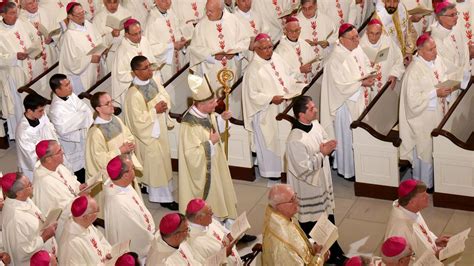Bishop Edward B. Scharfenberger of Albany has published a column on the election, “We hold these truths: On the founders of our country and today’s Catholic voters.” I must admit my expectations were set very low when I read the first line, “A surefire way of demonstrating the existence of universal truths is to consult common experience.” I had the sinking feeling that whatever was going to be said about the election would, well, lean more toward “common experience” than “universal truths.”
And, sadly, I turned out to be right.
What little was said about the election is contained in the paragraph below. First, the bishop recommends “a good consultation with one’s conscience.” But what follows certainly doesn’t help a Catholic who wants to take his advice seriously. A “good consultation” would require a proper ordering of the Church’s view of moral issues. Bishop Scharfenberger uses the kind of phraseology that has now become standard among the bishops and the state Catholic conferences, a wording that uses the conjunction “and” to indicate that all the moral issues contained in the sentence have equal moral importance. Note the phrase in italics:
“As this important presidential election looms, a good consultation with one’s conscience is in order, especially for Catholics who have a very rich tradition of moral and social teachings which not only affirms these fundamental rights, but also place them in wide and rich contexts like the issues of the sanctity of human life, religious liberty, public order, the freedom to move and migrate, the right to personal ownership and the commensurate good stewardship of goods and resources so that all humanity will enjoy the benefits of our common home in God’s creation.”
Thus, Bishop Scharfenberger fails to underscore the preeminence of the abortion issue in an election that will determine whether or not Hillary Clinton and all her Planned Parenthood pals will run our country. There’s no need to dwell on Hillary’s love affair with abortion, as it has been documented thoroughly elsewhere.
Just guess what “rights” are presented — the connective “and” — as being of the same importance as abortion: “the freedom to move and migrate.” For the Catholic bishops, the presidential election of 2016 is first and foremost about immigration, the life issue, as I have said earlier, just doesn’t matter to them.
Elsewhere in the column, the bishop provides a clue to the source of his confusion. He asks whether “we need the [Ten] commandments to teach us” that stealing, coveting, and bearing false witness are wrong. Bishop Scharfenberger, having already expressed his confidence in “common experience,” argues,
“Yet, even without legislation, I would submit that there is something in the core of every rational being of sound mind — we commonly call it “conscience” — that can detect and discern what is right and what is wrong….”
Yes, Catholics do affirm the natural law, but this particular election, I would argue, needs the kind of immediate clarity that one can gain from one of God’s Commandments, specifically, the Fifth:
“Thou shalt not murder” (Exodus 20:3).
The bishops keeps coming back to the need for a “well-formed” conscience, but doesn’t the shepherd spell it out for his sheep on the eve of the 2016 election? “Abortion is murder, and regardless of what a “good consultation” with consciences may reveal, it cannot ignore the fact that Hillary Clinton is promoting abortion/murder as a major part of her public policy.
I was especially saddened when Bishop Scharfenberger extolled, at length, the greatness of our Declaration of Independence and its “unalienable rights” of life, liberty, and the pursuit of happiness. The bishop made a point of explaining that “unalienable” means something that cannot be taken away. Hillary Clinton and Tim Kaine have done precisely that, as politicians they have denied the unalienable right to life, and will continue to do so if they are elected on November 7.
Why would Bishop Scharfenberger, or any bishop, remain silent about what is so obvious to so many faithful Catholics?
